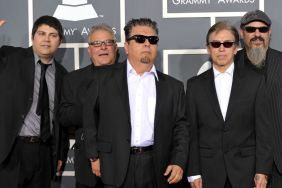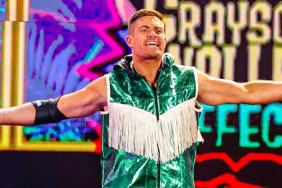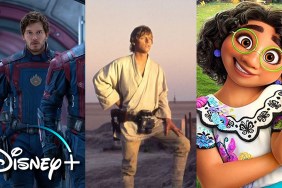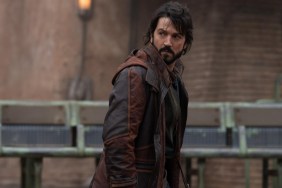
Shock Till You Drop: Tell me about Crave.
Charles de Lauzirika: It’s basically the story of a freelance photographer named Aiden, that lives in Detroit and makes peanuts shooting crime scenes and selling those photos. The years of exposure to the mean streets of Detroit and the gore of the crime scenes begin to take their toll on him and as we begin the movie, we see his inner fantasy life that he indulges in. Fantasies of violence, sex, anger, and darkness that are starting to leak out into reality. We realize that Aiden is on unsteady ground but then he meets this woman who lives next door to him named Virginia, who kind of gives him a strange sort of balance, and it’s interesting to explore that relationship because we know the entire time that he is a time bomb that could go off at any point. Then once she realizes that and leaves him, everything goes off the rail. It’s basically a psychological thriller with elements of romance, comedy, horror, and action even. So it’s a fractured genre hybrid as we go into this guy’s mind and learn what he’s all about.
Shock: What inspired the story?
De Lauzirika: Basically, I’ve been attached to direct this adaptation of a Phillip K Dick short story called “I Hope I shall Arrive Soon”. It’s an ambitious Science Fiction film that costs a fair amount of money so it was suggested that I make a smaller film first, before we try and raise the money for “I hope I Shall Arrive Soon”. At the time, my neighbor, Robert Lawton had made his first film, so I went to him and asked him if he had anything. He pitched me this idea of Travis Bickle meets Walter Mitty. I thought that was clever. We spent two months developing it. He wrote the first two drafts and I wrote the last two drafts. Rob’s side is sort of the guy who wants to lash out but also make things right, where my side is sort of the dysfunctional romance and the human consequence side of that type of spirit. Between the two of us, we form Aiden to some degree. And that dictates the story quite a bit.
Shock: Aiden’s a very lonely character, sort of a bullied and forgotten Travis Bickle. Was it hard to find the voice of kind of character?
De Lauzirika: Well I started writing the voice over based on how I think. When I’m driving down the street, I rehearse future conversations I know I’m gonna have or I think back on conversations I already had, and retroactively polish them in my head, like what I should have said. Once I got locked into that language of how we think, or at least how I think, that made it easy and kind of fun. It was very liberating. It wasn’t the typical sort of hard boiled narrator. He was much more direct, personal , and honest, I think.
Shock: His fantasies are so graphic but not uncommon, for lack of a better word. Did any of the situations he faced come from personal experience?
De Lauzirika: Mostly the relationship between Aiden and Virginia was loosely inspired by my own experiences. It was very therapeutic for me to get off my chest because while we were working on the script and prepping the movie, I was going through my own traumatic break up. So I kind of used all thyat energy and rather than abuse my friends with it and be totally annoying to everyone around me, I just took that stuff and put it in the script. It helped make it more than a traditional vigilante film. It helped make the charaters a little more interesting and a little more human.

De Lauzirika: It kind of was, mostly for independent film making, logistical kind of reasons. Because the reality of the situation, we didn’t have a big budget, we didn’t have a strong infrastructure for making this film. It was just this scrappy kind of “Hey, let’s go out and try to make a movie the best we can” kind of vibe. When you go out with that, you’re already limiting the types of actors that would be interested. You need actors with a little bit of faith, vision, and talent, to pull that off. We went through a lot of different actors. By the time Josh Lawson started becoming a front runner it was mostly because he caught it, not just as a performer, but as a writer. He got it on multiple levels and he makes a really good partner in realizing Aiden.
Shock: Aiden’s relationship with Virginia is very organic. How much was written and how much came from the actors working together?
De Lauzirika: I would say in terms of the dialogue, the black and white text of it, I’d say 98% of it was written. I wasn’t that strict with them, if they wanted to go off script and play, I’m all for that. But for the most part, they stuck to the script. Where I think they really played with it mostly, is with the energy, attitude, and cadence of the lines, especially Josh. He made Aiden far more likeable than I originally envisioned, which was great because now we can relate to this guy.
Shock: The end of the film is open to interpretation. Do you have a set idea in your mind of what happens to Aiden?
De Lauzirika: I do. But it doesn’t have to be that. You have three options, it could be Pete, it could be Virginia, it could be all in his imagination. Maybe it’s his conscience knocking. You have to ask yourself; is Pete even a real person. There is a scene early on in the dinner when Pete asks for a glass of water and the waitress delivers it to Aiden. You have to ask yourself, why did that happen? There’s a lot of different ways that it can be interpreted. And I’m happy with multiple interpretations. I love ambiguous endings. I produced the final cut restoration of Blade Runner. And one of the key parts of Blade Runner is the question; Is Deckard a replicant? The question is much more interesting than the answer, I think. I think it’s much more interesting to leave the theater with a question so people leave talking about it rather than having the answer handed to you on a silver platter. I kind of think that the answer is, in a traditional way, very obvious, but I also think there is plenty of room for it to be anybody.









